12 Best Tools for Automated Lead Generation [2026]

Read summarized version with
Lead generation is a crucial component of running a successful online business. But, it can also be one of the most time-consuming and frustrating tasks.
Let's face it—
Reaching out to prospects, collecting contact information, and nurturing leads is exhausting if you do it manually.
Thankfully, there is a solution. It's called lead generation automation. You can use the right software to automate many repetitive lead generation tasks.
In this article:
Automate and personalize lead generation at scale
Create popups that achieve up to 20% CTR and convert the right visitors with deep personalization.


Find more trusted software to your stack:
AI tools for ecommerce (for sales, lead gen, creating content, strategies, videos, and SEO optimization)
Eight top conversion rate optimization platforms (for analytics, lead capture, landing pages, and A/B testing)
What is automated lead generation?
Lead generation automation is the use of software and tools to automate the process of finding new customers. By automating tasks such as lead capture, lead scoring, and lead nurturing, businesses can generate a steady flow of qualified leads with minimal manual effort.
For example, you can set up popups on your business website to capture visitor information, such as their name and email address. This information can then be automatically sent to a customer relationship management (CRM) system. Using the information gathered from the lead capture form and CRM, you can set up targeted email campaigns using automated email marketing software.
The goal of automated lead generation is to save time and resources while still generating high-quality leads that are likely to convert into paying customers.
Other benefits of lead generation automation include:
Better customer analytics and more insights
Easier conversion optimization and A/B tests
Greater lead volume and increased ROI
Recent reports suggest that about over a half of companies are using some sort of automation in their marketing efforts. The majority of marketers believe that automation is essential to stay competitive in today's market.
 Expert tip
Expert tip
By using software to capture and score leads based on factors such as engagement and demographic information, businesses can prioritize their efforts. They can focus on the leads that are most likely to convert. This results in better lead quality and increased revenue.
How do you automate lead generation?
The difficulty of generating leads can vary depending on factors such as your industry, competition, and target audience. However, with the right strategies and tools in place, businesses can generate a steady flow of qualified leads.
To automate lead generation, businesses can use a combination of software and tools that are specifically designed for this purpose. This includes lead capture forms (such as popups), lead management with CRM software (here's how we do lead management), email marketing platforms, chatbots, and social media automation tools.
Automating lead generation involves these steps:
Step 1. Analyzing your target audience and customer personas
Step 2. Creating compelling marketing content on your website
Step 3. Using lead generation popups and forms for capturing contact details of your visitors
Step 4. Scoring and prioritizing leads based on their behavior and demographics
Step 5. Nurturing leads through targeted email campaigns, chatbots, and social media automation
Step 6. Converting leads into paying customers with personalized sales outreach
Now, it's time to explore some of the best tools that you can use.
A 60-day popup roadmap for your business that proves real ROI
See how to build an implementation plan that helps turn your popups into a measurable growth channel.


Examples of lead generation popup forms on websites
This playbook breaks down the highest-performing lead generation campaigns we see businesses using today. Click them to see how they work.

Welcome Offer
Turn new visitors into subscribers with an instant discount + social proof

Email & SMS
Turn new visitors into subscribers and collect their emails + phone numbers

Spin to Win Popup
Gamify email capture with a prize wheel
Best lead generation automation software
The best solutions for automating lead generation are:
Wisepops: automates lead capture on websites and sends leads to your CRM or ESP
Unbounce: creates and tests conversion-focused landing pages without coding
OptinMonster: captures emails with targeted popups and exit-intent
HubSpot: combines CRM, email, and automation to manage the full lead funnel
Marketo: automates B2B lead management, scoring, and multi-channel nurturing
Klaviyo: drives ecommerce sales with automated email and SMS flows
Mailchimp: streamlines email marketing with simple automation and list management
ActiveCampaign: powers advanced workflows with dynamic email and sales automation
Sprout Social: generates leads through social listening, scheduling, and engagement tools
Leadfeeder: uncovers companies visiting your site and syncs them to your CRM
Salesloft Drift: qualifies leads instantly with chatbots and real-time messaging
Intercom: automates customer conversations and lead nurturing through chat and messaging
All pricing details are up to date as of February 2026.
Software to automate lead generation on websites
Lead generation takes place on your website so this is where you should start setting up your automation. Onsite lead gen automation tools help to capture emails and create personalized experiences, leading to higher conversions.
Wisepops — convert more of your website traffic with advanced personalization, AI and behavioral targeting


Wisepops turns your website into a lead generation machine by capturing visitor information at precisely the right moments and then automatically syncing it to your CRM or email platform for immediate follow-up.
You can create campaigns such as newsletter signups, giveaways, personalized offers, product recommendations, and more using four channels:
Popups – Eye-catching overlays for maximum visibility
Embedded forms – Native form placements that blend with your site
Sticky bars – Persistent headers or footers that stay visible as visitors scroll
Onsite feed – Subtle notification-style messages
Try our interactive demo:
What makes Wisepops powerful is its intelligent targeting engine. Rather than showing the same message to everyone, you can trigger campaigns based on:
Visitor behavior (cart activity, pages viewed, time on site)
Traffic source and UTM parameters
Geographic location and device type
Number of visits and returning visitor status
Shopify store data (for ecommerce stores)


You can set up custom campaign display rules and triggers to maximize the number of leads you can capture on your website. This makes it a great automated lead generation app for those who'd like to do a lot of experiments.


For example—
You can make your marketing message appear to a certain category of visitors, on a specific page, or after a visitor clicks on a button or adds a product to the cart (doing so is easy thanks to built-in Shopify campaign display rules).
For instance, you can trigger a message to returning visitors who added an item to the cart during the last visit and offer them a personalized discount code:


Wisepops plugs seamlessly into your broader lead gen automation setup. When a visitor signs up via a Wisepops campaign, their information can be automatically sent to your CRM or email marketing platform.
From there, you can:
Score and segment leads based on behavior or source
Trigger targeted email sequences or SMS campaigns
Route high-value leads to your sales team in real-time
Personalize onsite experiences for returning visitors
Track performance metrics and optimize campaigns with A/B tests
By combining Wisepops with your CRM and email tools, lead capture becomes the first step in a fully automated, end-to-end lead management workflow.

Shopify
Connect your Shopify store to personalize and trigger campaigns based on store and visitor data.

Klaviyo
Target Klaviyo segments with personalized onsite campaigns and sync leads to your Klaviyo lists in real time.

Segment
Connect Segment to send visitor data from Wisepops to your entire marketing stack in real time.
Key features
Four Campaign Channels:
Popups for high-visibility moments
Embedded forms that integrate naturally into your pages
Sticky bars (persistent headers/footers)
Onsite feed for subtle, notification-style messaging
Campaign Creation & Design:
150+ conversion-optimized templates to start from
Visual drag-and-drop builder requiring zero code
AI-powered product recommendations that adapt to visitor behavior
Dynamic content insertion (automatically pull in product names, prices, discount codes, visitor names)
Mobile-responsive designs that adapt to any screen size
Create popups with conditional paths based on visitor choices
Advanced Targeting & Triggers:
Exit-intent detection to catch visitors before they leave
Cart activity tracking (items added, abandoned carts, cart value thresholds)
Returning vs. first-time visitor recognition
Number of visits and visit frequency
Specific page targeting and browsing history
UTM parameters and referral source tracking
Geolocation-based targeting
Device type (mobile, tablet, desktop)
Time on site and scroll depth triggers
Native Shopify display properties (product collections, cart contents, customer tags)
Klaviyo segment targeting for ultra-personalized campaigns
CRO & Testing:
Built-in experimentation framework with control groups
A/B testing capabilities across all campaign elements
Measure impact on time spent on site
Track revenue per visitor and conversion lift
Test multiple variants simultaneously
Statistical significance indicators
Analytics & Performance Tracking:
Goal tracking (signups, purchases, clicks)
Revenue attribution for each campaign
Real-time performance dashboards
Conversion rate monitoring by segment
Lead source analysis (by page, device, country)
Integrations & Automation:
Seamless Shopify and WooCommerce integrations
Real-time sync with Klaviyo segments
Segment integration to push data across your entire marketing stack
Direct connections to major CRMs and email platforms
Automatic lead routing based on behavior or value
Webhook support for custom integrations
Compliance & User Experience:
GDPR and CCPA compliant with built-in consent management
Mobile-optimized campaigns that don't interfere with site usability
Frequency capping to prevent campaign fatigue
Loading optimization to maintain site speed
Accessibility-friendly designs
Pros:
Easy-to-use visual campaign builder (no coding required)
Works seamlessly with Shopify, WooCommerce, and other website platforms
Ability to run multiple lead generation campaign formats simultaneously (e.g., popups + embedded forms + onsite feed)
Fine-grained targeting based on behaviors, UTM parameters, geolocation, device, number of visits, and more
GDPR and CCPA compliant with tools for managing consent
Mobile-optimized campaigns that don’t interfere with UX
Dynamic content insertion (e.g., product names, discounts) for personalization
Integrates with all popular email marketing platforms and CRMs
Strong customer support and personalized onboarding for new users
Cons:
No free plan (but there is a 14-day trial with no credit card required)
Product recommendations work on Shopify only
Who uses Wisepops for lead generation automation?
Wisepops is used by mid-sized and large ecommerce brands and B2B businesses like Converse, Blume, Timex, OddBalls, Aura, Dotdigital, and Hallow.

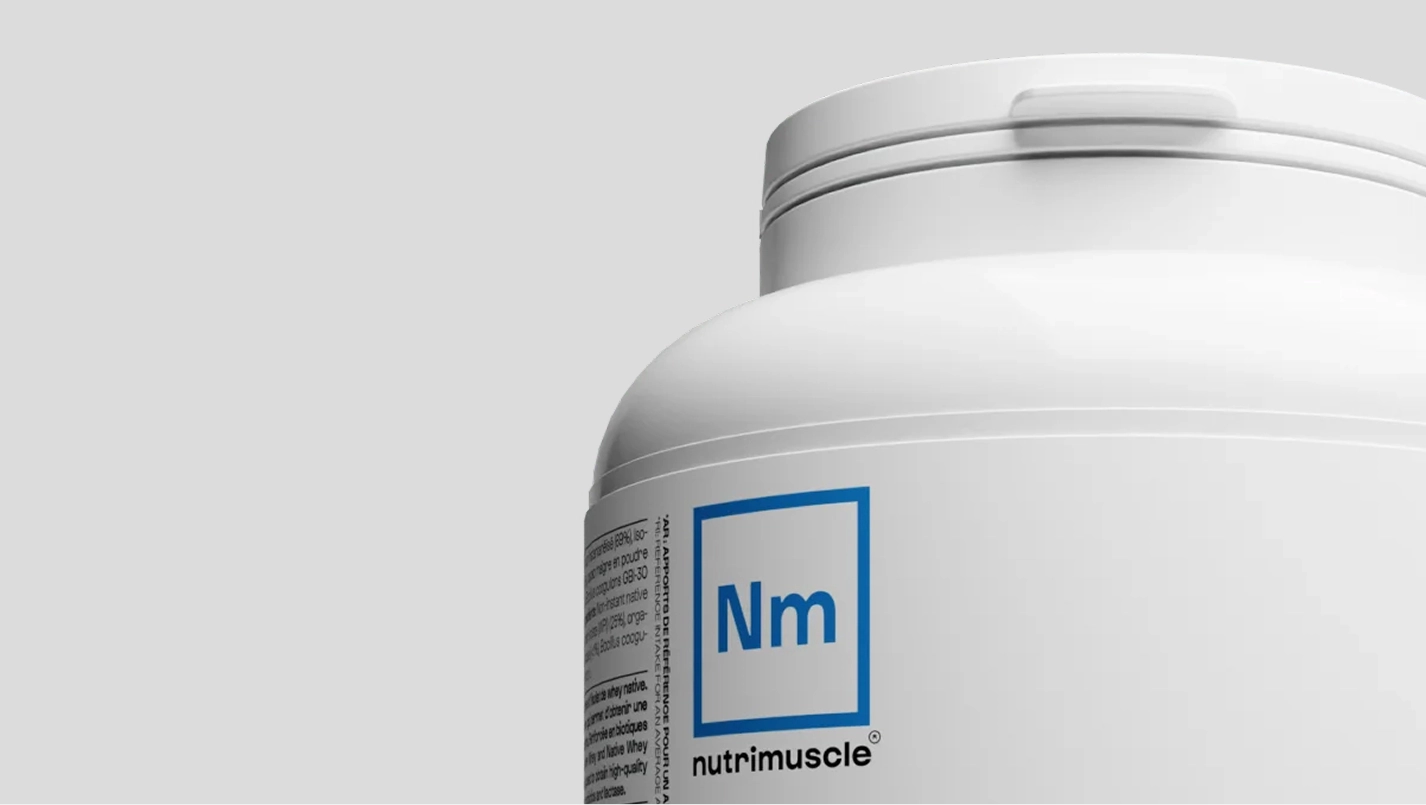
In addition to ecommerce, Wisepops supports lead generation automation for hospitality, telecom, SaaS, and education businesses:
The functionality and security level of Wisepops make it a great lead generation platform option for both mid-sized and enterprise-level companies.
Some examples of lead generation campaigns made with Wisepops:










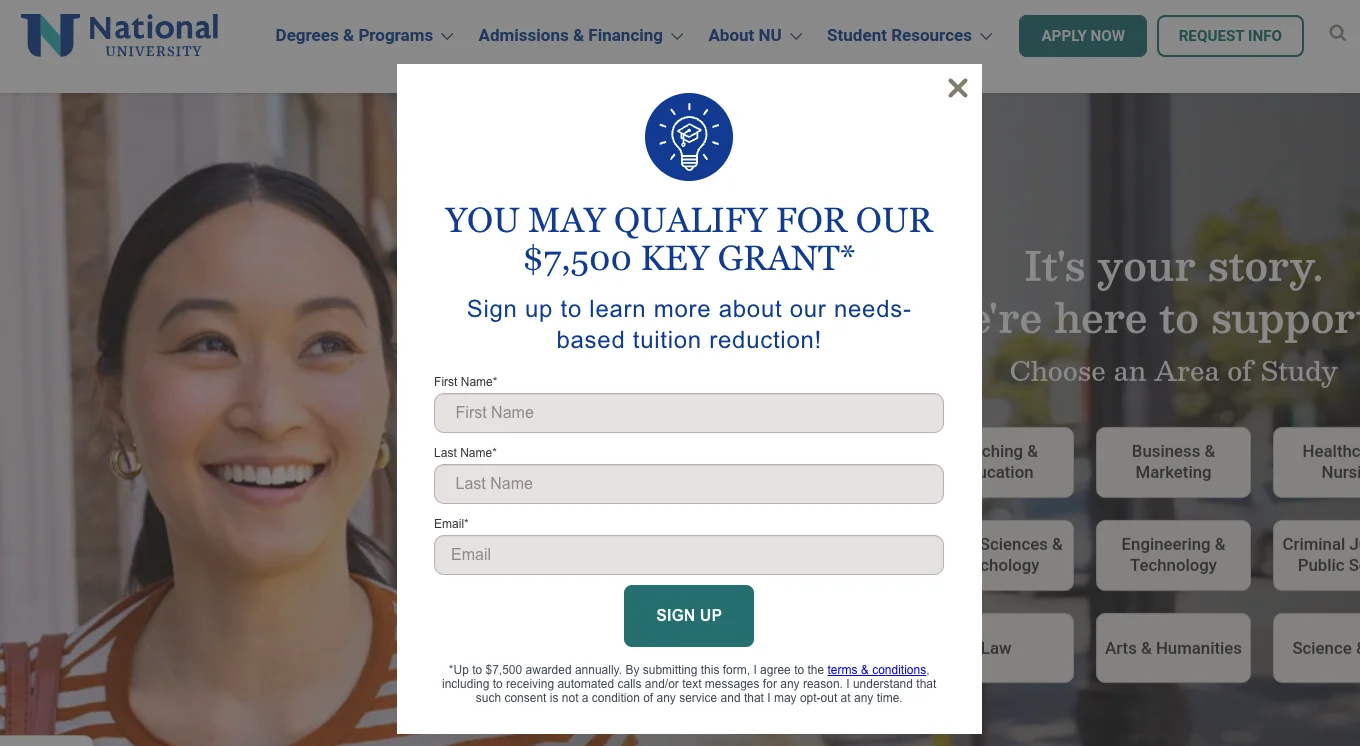

Pricing:
You can use all Wisepops features for free for 14 days with no commitment.
Paid plans start at $49/month. See full pricing details.
Try it risk-free and see how many leads you can generate:
Use instantly, no cc needed. Get a personalized demo
What do real users say about Wisepops?
“We noticed that our email list building performance drops by 50% when we don’t use Wisepops campaigns. Using Wisepops has been very important for our growth in the U.S., as it remains our most effective tool for building a customer base.”
Patricia Seidel, Growth Manager, Springly
"Wisepops has transformed how we connect with our customers online. The platform's features allow us to create engaging experiences that resonate with our audience while driving meaningful business results."
Justine Gauthier, Director of Digital and Marketing at L'Atelier d'Amaya
"The "spin-to-win" campaigns not only grew our list but also generated immediate sales and positive brand engagement. By gamifying email capture and promotions, we transformed routine processes into delightful interactions that drove real results. These insights will shape our future marketing strategies..."
Dan Mitchell, Ecommerce Manager, OddBalls
Unbounce
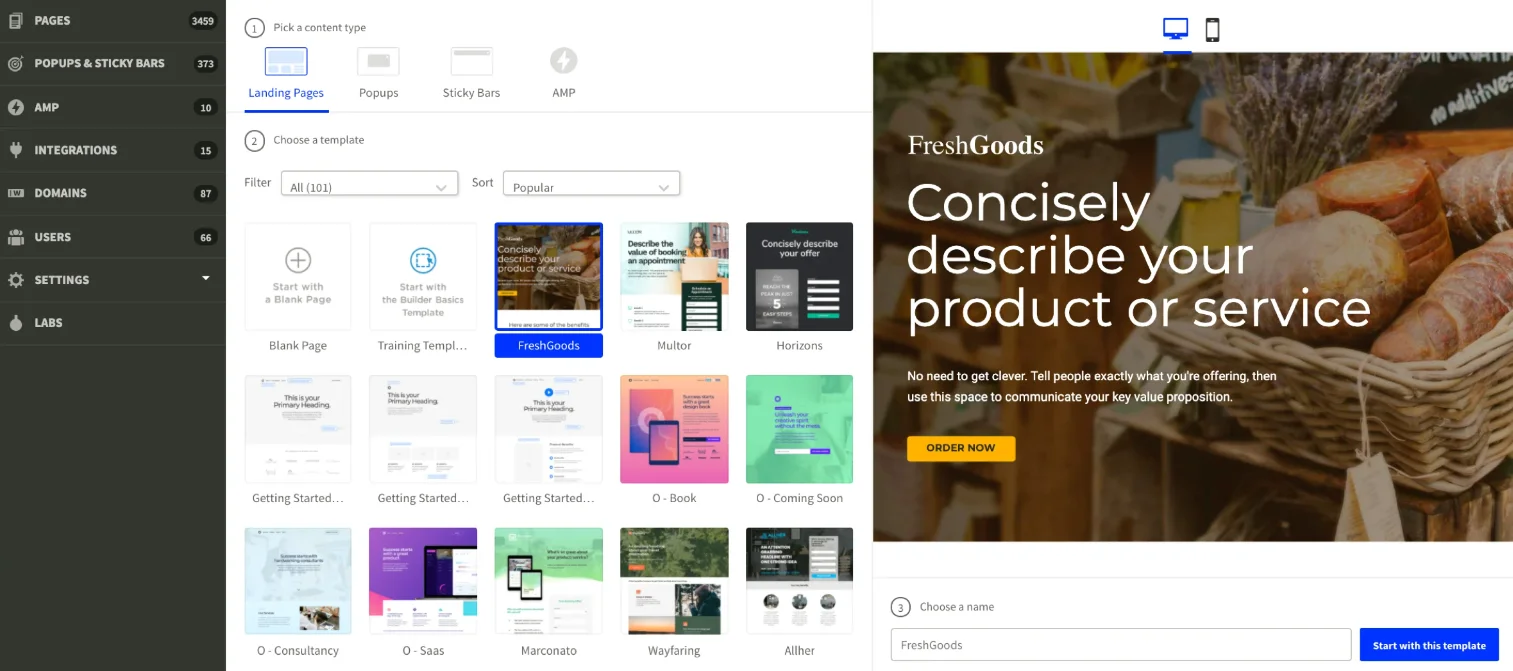

Unbounce allows you to create and test landing pages without any coding experience. It provides a variety of templates that are optimized for conversions and offers features that are useful for lead generation. With Unbounce, you can create custom landing pages for different marketing campaigns, such as PPC ads or social media campaigns.
This platform connects with solutions such as HubSpot or Marketo to build advanced automation flows for lead generation and lead scoring.
Key features:
Visual drag-and-drop landing page creator
A/B testing and conversion-focused templates
Dynamic text replacement for ecommerce personalization
Lead capture forms
Unbounce is ideal for businesses of all sizes looking to create landing pages that convert visitors into leads. Its A/B testing and analytics features allow you to optimize your landing pages for maximum conversions.
Pros:
Easy to use and no coding required
Flexible integration with various marketing platforms
Great analytics and A/B testing tools
Cons:
Limited features compared to other marketing automation platforms
Pricing:
Free 14-day trial available. Unlimited landing pages, popups, and sticky bars starting from $99/month for one user with monthly billing.
If you want to grow your contact list, read our guide to collecting emails on websites.
OptinMonster


OptinMonster is a lead generation automation tool that helps businesses create high-converting email popups, slide-ins, and other types of signup forms. It allows you to create targeted campaigns, segment your audience, and track your results in real-time. OptinMonster offers lot of pre-built templates and design options that are fully customizable to suit your brand.
Key features:
Easy to use WYSIWYG form builder
Exit-intent detection to target visitors who are about to leave your site
Behavioral triggers for personalized targeting
Customizable templates and designs
Integration with various email marketing tools
OptinMonster is best for businesses that want to grow their email list and increase conversions. It is especially useful for those who want to retarget and re-engage users who are about to leave their website.
Pros:
Powerful targeting and segmentation options
Great analytics and A/B testing features
Flexible integration with multiple marketing platforms
Cons:
Can be pricey for smaller businesses (that's why there are many OptinMonster alternatives)
No free trial
Pricing:
OptinMonster comes with a free 14-day money-back guarantee starter option but no free trial. Paid plans start at $21/month.
CRM & marketing automation tools
Customer Relationship Management (CRM) and marketing automation tools are used to manage customer interactions and automate lead generation processes. These tools allow you to track customer behavior and create targeted campaigns that are tailored to their needs. They can also help to automate lead nurturing processes, ensuring that leads are engaged until they are ready to convert.
HubSpot
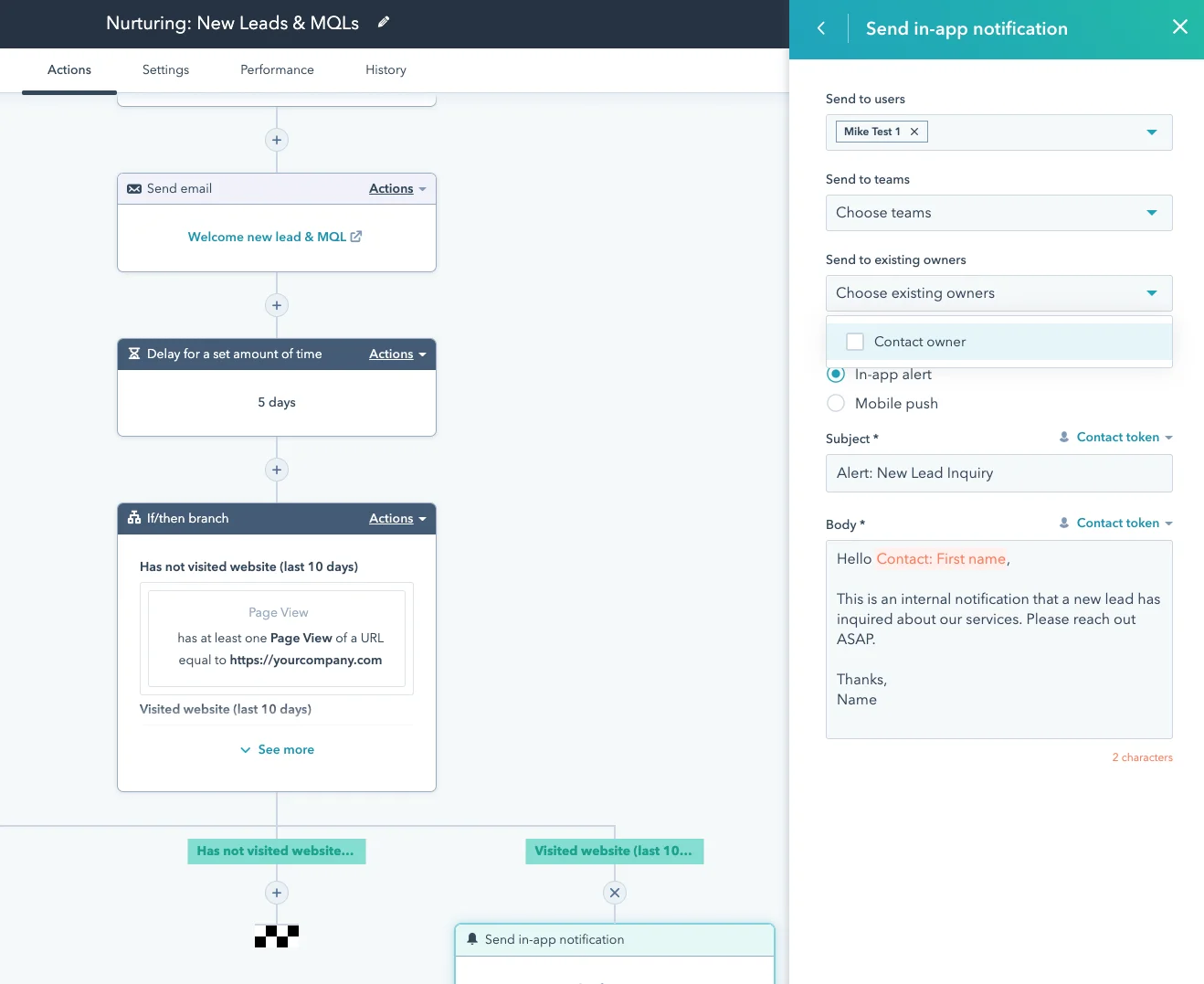

HubSpot is an all-in-one marketing automation platform that includes a variety of tools for lead generation, customer relationship management, and sales. It allows businesses to create targeted campaigns, manage leads, and automate various marketing processes, including lead generation. HubSpot offers a comprehensive suite of tools that can help businesses of all sizes grow their customer base.
Key features:
CRM for managing all customer interactions
Email marketing and automation tools
Landing page builder
Marketing analytics and A/B testing
Sales automation tools
HubSpot is best for businesses that want a complete marketing automation solution. It also has a freemium plan which is perfect for new websites with small traffic.
Pros:
Comprehensive marketing automation solution
Flexible integration with various marketing tools
Great analytics and A/B testing features
Cons:
Steep learning curve for beginners
The popups feel bland and generic, lack customization options
Some plans are quite pricey
Pricing:
HubSpot offers a free plan with limited features (for example, 2,000 marketing emails per month and a smaller number of interactions). Omnichannel marketing automation is available in the Marketing Hub Professional plan that starts at about $740/mo.
Marketo
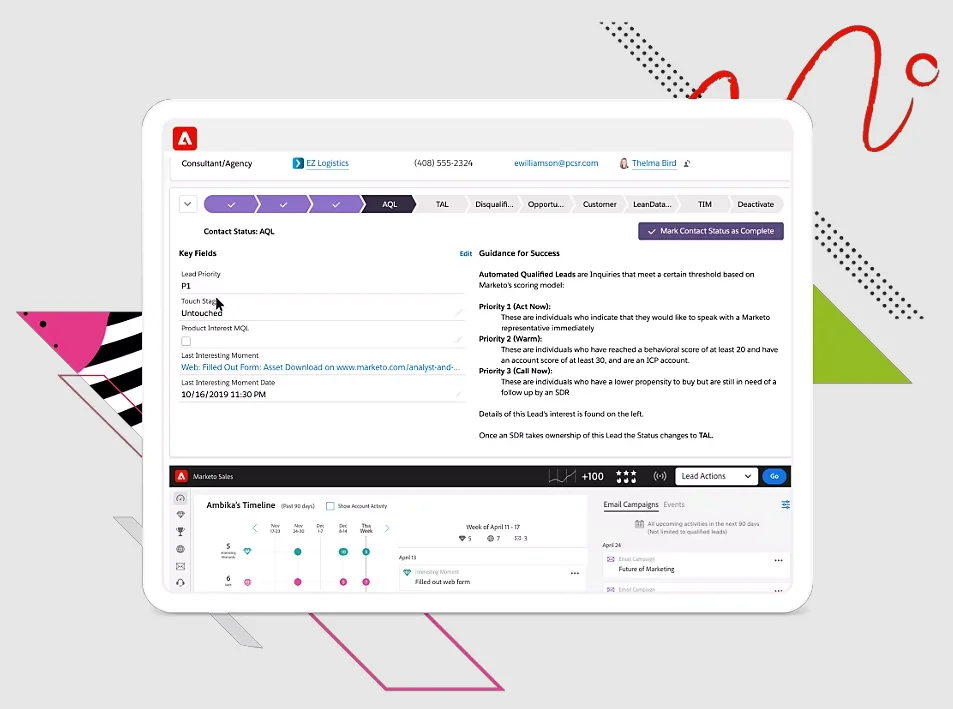

Marketo is a cloud-based marketing automation platform that provides tools for lead generation, lead management, email marketing, and analytics. It can be used for tracking customer behavior across various channels, including email, social media, and web. Marketo's lead management capabilities allow businesses to capture and qualify leads, track their behavior, and assign scores based on their level of engagement.
Key features:
Lead management and scoring
Email marketing and automation tools
Landing page builder
Real-time personalization
Analytics and A/B testing
CRM integration
Marketo was acquired by Adobe and became part of Adobe Experience Cloud, a suite of solutions that helps businesses manage their digital experiences across multiple channels. By integrating Marketo's marketing automation capabilities with Adobe's content creation, data, and analytics tools, Adobe aimed to provide a more complete solution for marketers. It is particularly suitable for B2B companies looking to manage complex sales cycles and multi-touch campaigns.
Pros:
Powerful lead management and scoring features
Advanced personalization and targeting options
Flexible integrations with various marketing and sales tools
Cons:
Higher price point compared to other marketing automation platforms
Pricing:
Marketo's pricing is based on the number of contacts and features required. Contact Marketo for a quote.
Email marketing tools
Email marketing platforms can help you segment email lists and create workflows that target specific groups of leads or customers. It is possible to set up personalized email campaigns and automate some of the most important parts of the lead nurturing process.
Klaviyo


Klaviyo specializes in email and SMS marketing. It provides tools for segmentation, lead generation automation, and analytics. Klaviyo's email marketing capabilities include customizable templates, A/B testing, and automated flows. These email automation series are great for ecommerce, especially if you want to reduce cart abandonment. With Klaviyo, businesses can also track revenue and ROI for each campaign, making it easier to measure the success of their marketing efforts.
Key features:
Email and SMS marketing automation
Segmentation and personalization
Ecommerce integrations
Abandoned cart and win-back flows
Analytics and A/B testing
Klaviyo is best for ecommerce businesses looking to automate their email and SMS lead nurturing processes and increase revenue. Its ecommerce integrations allow businesses to track customer behavior, such as purchases and product views, and use that data to create targeted campaigns.
You can also design amazing automated onsite and off-site marketing automation flows by combining Klaviyo with tools like Wisepops.


Pros:
Easy to use and navigate
Powerful ecommerce integrations and revenue tracking
Flexible marketing automation and personalization options
CRM features for B2B
Cons:
Limited integrations with non-ecommerce tools
More expensive compared to other similar solutions
Pricing:
You can use Klaviyo for free to send emails to up to 500 contacts monthly.
In general, Klaviyo's pricing is based on the number of contacts and features that you need. Paid plans start at $45/month for core email functionalities. SMS features are available in the higher, $60/mo plan.
Mailchimp


Mailchimp is an all-in-one marketing platform that offers a variety of tools for generating leads and managing email marketing campaigns. Its user-friendly interface allows users to create automated lead generation flows and track their performance. Additionally, it provides features such as landing pages, social media advertising, and email marketing automation workflows.
Key features:
Email marketing and lead automation tools
Landing page builder
Social media advertising features
Marketing automation workflows
Analytics and A/B testing
Multiple integrations
Mailchimp is known for its affordability and ease of use, making it a popular choice for SMBs. Its drag-and-drop interface allows you to set up custom campaigns without the need for any technical expertise.
Pros:
Variety of integrations with other marketing and lead generation tools
Affordable pricing options for businesses of all sizes
Lots of official resources and tutorials
Cons:
Out-of-the box popup signup forms available in Mailchimp are rather basic
Pricing:
Mailchimp offers a free plan for up to 1,000 emails, with limited features. Paid plans start at $13/month and increase in price based on the number of contacts.
ActiveCampaign


Like Mailchimp, ActiveCampaign is a marketing automation platform that offers a variety of tools for online businesses to manage their automation workflows and customer engagement. It is primarily designed to help businesses create personalized customer experiences through targeted email campaigns and SMS messaging. However, it also lets you set up forms and build automated lead generation and lead nurturing workflows.
Key features:
Dynamic content based on individual lead data
Automated email series with many sequence templates
Lead scoring based on engagement
Split testing features
Automation workflows allow you to create customized sequences of emails, SMS messages, and other marketing activities that are triggered by specific user behavior. It is a great platform for businesses looking to generate leads automatically and optimize their sales funnels.
Pros:
Powerful flow automation capabilities
Flexible integrations with other tools
Customizable campaigns with dynamic content
Cons:
The UI is less friendly and some users may find the tool slightly overwhelming
Pricing:
You can try ActiveCampaign for free for 14 days. Paid plans start at $15/month.
Social media marketing tools & business intelligence
These tools offer a wide range of features, including social listening, which can be a powerful technique for automated lead generation. You can monitor social media platforms for mentions of your brand, industry trends, or even conversations between potential leads. By identifying these, it is possible to engage with leads and customers in real-time, build relationships, and generate new sales prospects.
Sprout Social


Sprout Social is a social media management platform. It provides tools for scheduling, publishing, and analyzing social media content. Social Sprout's social listening features let you track relevant mentions and automate your responses. The platform also allows you to build lead generation bots for social media.
Key features:
Social media management
Scheduling and publishing tools
Social listening and engagement
Analytics and reporting
Sprout Social is best for businesses looking to manage multiple social media accounts and monitor their brand reputation online. Its social listening features make it a valuable platform for automating lead generation and customer engagement.
Pros:
Powerful social listening and engagement features
Robust analytics and reporting tools
Easy-to-use interface
Cons:
Limited integrations with non-social media tools
Pricing:
You can try Sprout Social for free with a 30-day trial. The Standard plan with tasking and social CRM tools starts from $199 per month.
Leadfeeder


Leadfeeder is a lead generation tool that uses website visitor data to identify potential customers. It also integrates with popular social media platforms like LinkedIn to help you find leads and engage with them. With Leadfeeder's lead scoring and qualification features, you can focus on the most promising user segments.
Key features:
Identify the names of the companies visiting your website
Reveal the exact behavior of users
Unique database of static and dynamic IPs
Lead scoring and qualification
Integration with CRM and marketing automation tools
Automated lead nurturing workflows
Real-time alerts and notifications
Leadfeeder is best for B2B lead generation. You can use it to turn anonymous website visitors into actionable sales leads. But it works better if your operations are focused on an account-based approach.
Pros:
You can easily filter and hide unwanted companies or bots
Insights based on exact behavior of the companies visiting your website
A track record of quality leads
Cons:
There is only one paid plan and the tool is somewhat expensive
Pricing:
You can identify up to 100 companies for free using fresh data with the lite plan. For $139 a month you unlock unlimited data storage and remove the cap on identified companies.
Chatbots and messaging tools
Chatbots and other conversational AI tools offer an effective way to automate lead generation and customer service processes. These solutions can capture lead information and route leads to the appropriate sales representative.
Salesloft Drift


Salesloft Drift uses conversational marketing for streamlining sales and marketing processes and turning website visitors into leads. It is an automated lead generation tool that uses bots to help you engage with potential customers in real-time. With Salesloft Drift, you can add a live chat widget on your website and weaponizes the power of messaging. Bots start conversations with your website visitors and collect information about them on autopilot.
Key features:
Chatbots for automated conversations
Playbooks and chatbot templates
Conversational landing pages
Lead routing and qualification
Chat analytics and reporting
Drift's chatbots help online companies engage with website visitors in a personalized way, 24/7. They can be used to qualify leads, route them to the right sales team member, and even schedule meetings with prospects.
Pros:
Advanced and highly customizable chatbot functionality
Integrations with other sales and marketing tools
Real-time alerts and notifications
Cons:
Pricing can be expensive for small businesses
Pricing:
Salesloft Drift does not list pricing on its website. Contact the company for details.
Intercom


Intercom is a customer messaging platform that lets you communicate with your customers across different channels, including website chat and social media. The tool has many additional modules and extensions. Its chatbot feature helps automate lead generation and customer support processes. Intercom offers a suite of messaging tools that help build connections with customers in real-time and provide personalized support.
Key features:
Automated chatbots for lead generation and customer support
Message tagging and filtering for better organization
Advanced reporting and analytics
Integrations with other sales and marketing tools
Intercom is a great choice for businesses who need personalized messaging and advanced reporting to track engagement and conversions. The pricing plans may seem expensive for small businesses, but the features and capabilities are invaluable for larger enterprises with complex automation and customer support needs.
Pros:
Multiple modules and apps for additional functionalities
Powerful messaging and conversational marketing features for lead generation
Advanced analytics
Cons:
Pricing may be prohibitive for small businesses
Limited social media integration
Pricing:
Intercom offers a 14-day free trial. Its most affordable paid option (the Essential plan) costs $39/month per seat.
Summary
Automated lead generation can significantly improve your business's sales funnel. Whether you're just starting out or looking to take your business to the next level, using lead generation software is a smart investment. And, as you can see, there are many online solutions that you can try.
Here is a quick overview that summarizes our list of the best automatic lead generation apps:
Wisepops—Onsite marketing platform that captures emails with targeted popups, signup forms, and the onsite feed and sends them to CRM and email marketing tools
Unbounce—Landing page builder that allows businesses to create high-converting pages without coding skills.
OptinMonster—Lead capture and conversion optimization tool that helps businesses grow their email list and improve website conversions.
HubSpot—Marketing automation platform that provides tools for lead generation, CRM, and customer engagement.
Marketo—Marketing automation software that provides tools for lead management, email marketing, and analytics.
Klaviyo—Email marketing platform that helps businesses create and send personalized emails to their customers.
Mailchimp—All-in-one marketing platform that provides tools for email marketing, social media management, and website building.
ActiveCampaign—Marketing automation software that provides tools for email marketing, CRM, and sales automation.
Sprout Social—Social media management platform with social listening features for automated lead generation and customer engagement.
Leadfeeder—Tool that identifies companies that have visited your website and provides information about their behavior on your site
Salesloft Drift—Automated lead generation tool that uses bots to help businesses engage with potential customers in real-time.
Intercom—Customer messaging platform that provides automated chatbots for lead generation and customer support.
Each of these tools has unique features that can increase your lead volume, improve their conversion rates, and ultimately, increase their ROI.
Get started
in minutes
Start converting more visitors today.
Get started in minutes and see results right after.

